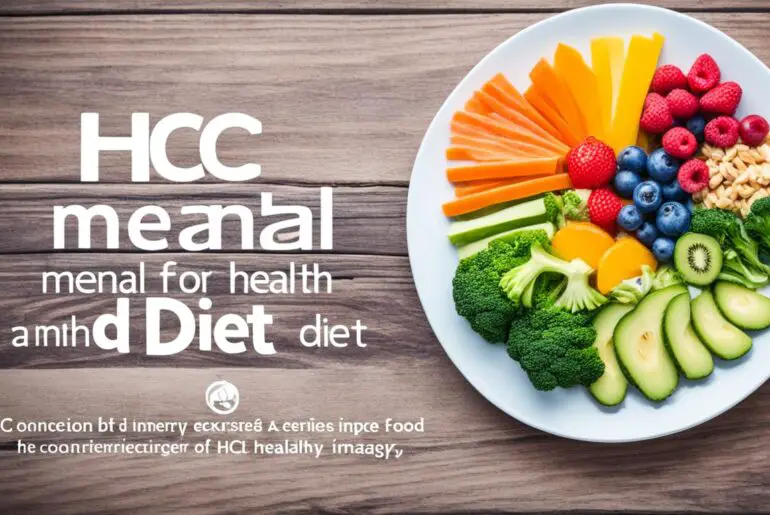Did you know that adequate sleep can significantly impact your weight loss journey on the HCG diet? It’s true – a scientific study found that individuals who slept for 8 hours a night lost more fat and retained more muscle compared to those who had only 5.5 hours of sleep. Sleep plays a crucial role in weight loss, especially for HCG dieters. Not getting enough sleep can hinder your progress and make it harder to achieve your desired results.
Key Takeaways:
- Adequate sleep is essential for maximizing weight loss results on the HCG diet.
- Lack of sleep can lead to a higher ratio of muscle loss to fat loss.
- Poor sleep can increase levels of hunger hormones, making it harder to stick to the HCG diet plan.
- Creating a consistent sleep routine and avoiding blue light exposure can improve sleep quality on the HCG diet.
- Managing stress and balancing hormones play a significant role in promoting better sleep patterns.
The Importance of Sleep for HCG Dieters
Sleep quality on the HCG Diet is a crucial factor that can greatly impact your weight loss journey. Improving sleep on the HCG Diet is essential for achieving the desired results and maximizing the benefits of the diet plan.
When it comes to weight loss, sleep plays a significant role, particularly for HCG dieters. Inadequate sleep can lead to a higher ratio of muscle loss to fat loss, making it more challenging to achieve your weight loss goals. Additionally, insufficient sleep can result in increased levels of hunger hormones, such as ghrelin, which can make it harder to adhere to the HCG diet plan.
High-quality sleep is critical for HCG dieters to optimize their weight loss efforts. By prioritizing sleep, you can enhance your body’s ability to burn fat while preserving lean muscle mass. Sleep quality on the HCG Diet can also improve overall metabolism, allowing you to achieve your weight loss goals more efficiently.
Improving sleep on the HCG Diet involves several strategies. Creating a consistent sleep routine, ensuring a comfortable sleep environment, and implementing relaxation techniques before bedtime can all contribute to better sleep quality. Additionally, managing stress levels through practices like meditation or deep breathing exercises can improve sleep patterns and allow for more restful sleep.
It’s important to note that sleep quality on the HCG Diet goes beyond the number of hours you spend in bed. It’s about the depth and restfulness of your sleep, as well as the overall sleep architecture. With improved sleep quality, you can optimize your weight loss while following the HCG Diet and experience greater overall well-being.
“A good night’s sleep is essential for HCG dieters to maximize weight loss and achieve their desired results. By prioritizing sleep, you can enhance fat loss, preserve muscle mass, and optimize your overall metabolic function.”
| Sleep Quality Factors | Impact on Weight Loss |
|---|---|
| Consistent sleep routine | Improves overall sleep quality |
| Comfortable sleep environment | Enhances restfulness and reduces sleep disturbances |
| Stress management techniques | Promotes relaxation and deeper sleep |
| Relaxation before bedtime | Facilitates a smoother transition into sleep |
Tips for Better Sleep on the HCG Diet

Sleep is crucial for maintaining overall health, and it plays an especially important role for those following the HCG diet. Inadequate sleep can hinder weight loss efforts and impact progress. To optimize sleep quality while on the HCG diet, here are some helpful tips:
- Create a consistent sleep routine: Establishing set bedtimes and wake-up times can help regulate your body’s internal clock, making it easier to fall asleep and wake up feeling refreshed.
- Avoid blue light exposure: Electronics emit blue light, which can disrupt your sleep cycle. Minimize electronic device usage, especially in the hours leading up to bedtime. Consider using blue light-blocking glasses or apps to reduce the exposure.
- Manage stress: High stress levels can make it difficult to fall asleep and stay asleep. Incorporate stress-reducing activities into your daily routine, such as meditation, deep breathing exercises, or engaging in a relaxing hobby.
- Balance hormones: Hormonal imbalances can impact sleep quality. Consult with a healthcare professional to ensure your hormone levels are balanced and, if necessary, explore hormone therapies that promote better sleep.
- Watch what you consume: Be mindful of what you eat and drink, especially in the evening. Avoid consuming caffeine or large meals close to bedtime, as these can disrupt sleep patterns.
Implementing these sleep tips can help HCG dieters achieve better sleep and enhance their weight loss results on the HCG diet. By prioritizing good sleep hygiene and making sleep a priority, you can optimize both your weight loss journey and overall well-being.
Understanding Cortisol and Sleep on the HCG Diet
When following the HCG diet, it’s important to understand the impact of cortisol, a stress hormone, on sleep patterns. Dieting itself can be considered a stressor to the body, leading to elevated cortisol levels. Proper sleep plays a crucial role in regulating cortisol and promoting better sleep patterns on the HCG diet.
Cortisol, often referred to as the “stress hormone,” is released by the body in response to stress. It helps regulate various bodily functions, including sleep-wake cycles. However, when cortisol levels remain elevated for an extended period, it can disrupt sleep patterns and impact overall well-being.
On the HCG diet, the body undergoes significant changes as weight loss occurs. This process can introduce additional stress to the body, potentially raising cortisol levels. Elevated cortisol can lead to insomnia, fragmented sleep, or difficulty falling asleep. Understanding this relationship between cortisol and sleep on the HCG diet is essential for optimizing sleep quality and promoting a successful weight loss journey.
Avoiding long rounds of the HCG diet is recommended as prolonged calorie restriction and dieting can lead to perpetually raised cortisol levels. By establishing well-planned rounds and taking breaks between rounds, individuals can help prevent continuously elevated cortisol levels and promote better sleep.
Improving Sleep on the HCG Diet
To enhance sleep quality and manage cortisol levels on the HCG diet, consider implementing the following strategies:
- Stress reduction: Explore stress management techniques such as meditation, deep breathing exercises, or engaging in relaxing activities to reduce overall stress levels.
- Consistent sleep schedule: Establish a regular sleep routine by going to bed and waking up at consistent times to regulate your body’s internal clock.
- Optimize sleep environment: Create a sleep-friendly environment by keeping your bedroom cool, dark, and quiet. Consider using earplugs, blackout curtains, or white noise machines if necessary.
- Avoid stimulating activities before bed: Minimize exposure to blue light from electronic devices and avoid engaging in stimulating activities that may interfere with sleep.
By incorporating these techniques into your routine, you can promote healthier sleep patterns and optimize your weight loss efforts on the HCG diet.
The Link Between Sleep Deprivation and Weight Gain

Sleep deprivation can have a significant impact on weight gain and can make it more difficult to achieve weight loss goals, even when following a diet like the HCG Diet. Research has shown that lack of sleep disrupts the hormones related to hunger and appetite, leading to increased food cravings and a higher likelihood of consuming calorie-dense foods. Additionally, inadequate sleep can decrease metabolism and energy expenditure, making it harder to burn calories and lose weight.
By prioritizing good sleep on the HCG Diet, individuals can potentially prevent weight gain, maintain a healthy metabolism, and optimize their weight loss results. *Promoting good sleep* on the HCG Diet is crucial for long-term success and overall well-being.
The National Sleep Foundation recommends that adults aim for 7-9 hours of quality sleep per night to support optimal health and weight management.
Getting enough sleep not only helps regulate hunger hormones but also improves cognitive function and enhances mood, which can positively impact adherence to the diet plan. When well-rested, individuals on the HCG Diet are more likely to make healthier food choices and have the energy to engage in physical activity, further supporting their weight loss efforts.
Creating a conducive sleep environment, practicing good sleep hygiene, and managing stress are all essential factors that contribute to *sleep optimization* on the HCG Diet. By implementing these strategies, individuals can improve their sleep quality, maintain a healthy weight, and better achieve their weight loss goals.
*Promoting good sleep* on the HCG Diet is just as important as following the recommended dietary guidelines. Prioritizing adequate rest and incorporating strategies to enhance sleep quality can significantly improve the overall effectiveness of the HCG Diet and contribute to long-term weight management success.
The Role of Sleep Hygiene in Quality Sleep
Sleep hygiene plays a crucial role in promoting quality sleep, especially when following the HCG Diet. By implementing effective sleep hygiene practices, individuals can improve their sleep patterns and enhance the overall effectiveness of the diet.
One essential aspect of sleep hygiene is establishing a consistent sleep schedule. Going to bed and waking up at the same time every day helps regulate the body’s internal clock and promotes a more restful sleep. This regular schedule ensures that the body can adjust and align its sleep-wake cycle accordingly.
Creating a relaxing sleep environment is another vital sleep hygiene practice. The bedroom should be a peaceful sanctuary conducive to sleep. This can be achieved by keeping the room cool, dark, and quiet. Consider using blackout curtains to block out any external light, investing in a comfortable mattress and pillow, and using white noise machines or earplugs to minimize disruptive sounds.
Avoiding stimulants such as caffeine is equally important for quality sleep on the HCG Diet. Caffeine can interfere with the body’s ability to fall asleep and stay asleep. To optimize sleep quality, it is advisable to avoid consuming caffeine at least six hours before bedtime.
Implementing these sleep hygiene practices can significantly improve sleep quality and enhance the effectiveness of the HCG Diet. Quality sleep enables the body to restore and recharge, allowing for better weight loss results and overall well-being.
The Importance of Consistent Sleep Schedule
Establishing a consistent sleep schedule helps regulate the body’s circadian rhythm, ensuring a more natural and restful sleep. Going to bed and waking up at the same time every day trains the body to recognize when it’s time to sleep and when it’s time to wake up. This routine promotes better sleep quality and overall sleep patterns.
Creating a Relaxing Sleep Environment
A relaxing sleep environment is crucial for quality sleep. Keeping the bedroom cool, dark, and quiet promotes better relaxation and deeper sleep. Investing in a comfortable mattress and pillow can also contribute to a more comfortable sleep experience.
Avoiding Stimulants
Stimulants such as caffeine can interfere with the body’s ability to fall asleep and stay asleep. It is important to avoid consuming caffeine in the hours leading up to bedtime to enhance sleep quality on the HCG Diet.
Managing Stress to Enhance Sleep on the HCG Diet

Stress management is an essential aspect of optimizing sleep on the HCG Diet. Stress can have a negative impact on sleep quality, which in turn can affect weight loss progress. To promote better sleep and overall well-being, it is important to implement effective stress management techniques tailored to your needs and preferences.
Yoga and Meditation
Yoga and meditation are powerful stress reduction practices that can help calm the mind and relax the body. Engaging in gentle yoga poses and practicing mindfulness meditation before bedtime can promote a sense of tranquility and prepare you for a restful night’s sleep. These activities can reduce the impact of stress on your sleep, allowing you to wake up feeling refreshed and rejuvenated.
“Yoga is the journey of the self, through the self, to the self.” – The Bhagavad Gita
Engaging in Relaxing Activities
Participating in activities that bring you joy and relaxation can significantly reduce stress levels and enhance sleep on the HCG Diet. Whether it’s reading a book, listening to soothing music, taking a warm bath, or engaging in a hobby, finding time for self-care and relaxation can help alleviate stress. By dedicating time each day to activities that promote calmness, you can create a harmonious environment that supports quality sleep.
Creating a Stress-Free Bedtime Routine
Establishing a stress-free bedtime routine can signal to your body and mind that it is time to unwind and prepare for sleep. Incorporate activities such as gentle stretching, deep breathing exercises, or journaling to release any remaining tension from the day. Additionally, avoiding stimulating activities and electronics in the hour leading up to bedtime can help calm your mind and set the stage for a peaceful night’s sleep.
| Stress Management Techniques for Better Sleep on the HCG Diet | Description |
|---|---|
| Yoga | A practice that combines physical postures, breathing exercises, and meditation to promote relaxation and stress reduction. |
| Meditation | A technique that focuses attention and promotes mindfulness, leading to a calm and clear state of mind. |
| Engaging in Relaxing Activities | Participating in activities that bring joy and relaxation, such as reading, listening to music, taking a bath, or pursuing hobbies. |
| Creating a Stress-Free Bedtime Routine | Establishing a routine that includes calming activities, such as stretching, deep breathing exercises, or journaling, to unwind and prepare for sleep. |
By taking the time to manage stress effectively, you can optimize your sleep patterns on the HCG Diet and support your overall well-being. Remember, reducing stress is not only beneficial for better sleep, but it also contributes to successful weight loss and a healthier lifestyle.
The Impact of Blue Light on Sleep

One factor that can significantly affect sleep quality on the HCG Diet is exposure to blue light emitted from electronic devices. Blue light can interfere with the body’s natural sleep-wake cycle, making it difficult to fall asleep and stay asleep throughout the night.
Exposure to blue light before bedtime can suppress the production of melatonin, a hormone that regulates sleep. When melatonin levels are disrupted, it can lead to difficulties in falling asleep and achieving restful sleep.
To optimize sleep on the HCG Diet, it is essential to reduce exposure to blue light, especially in the evening hours. Here are a few strategies to minimize blue light exposure:
- Avoid using electronic devices such as smartphones, tablets, and computers at least one hour before bedtime. Instead, engage in relaxing activities such as reading a book or taking a warm bath.
- Use blue light-blocking glasses or apps that filter out blue light from electronic screens. This can help reduce the impact of blue light on melatonin production and promote better sleep.
- Adjust the settings on electronic devices to enable the “night mode” or “blue light filter” feature. This feature reduces the amount of blue light emitted by the device, allowing for a more sleep-friendly environment.
By implementing these strategies and reducing blue light exposure, individuals can enhance their sleep quality on the HCG Diet. Getting adequate, high-quality sleep is crucial for overall health and well-being, as it supports proper hormone balance, metabolism, and weight loss efforts.
The Connection Between Hormones and Sleep

Hormonal imbalances can have a significant impact on sleep patterns, making it difficult to achieve restorative sleep. In the context of the HCG Diet, proper hormone balance is crucial for promoting good sleep and maximizing its benefits. One hormone that plays a key role in sleep is cortisol, often referred to as the stress hormone.
Cortisol imbalances can lead to insomnia and other sleep disturbances, which can in turn affect the overall success of the HCG Diet. To optimize sleep quality on the HCG Diet, it’s essential to address any hormone imbalances and regulate cortisol levels. Consulting with a specialist who can test hormone levels and provide targeted interventions can help individuals improve their sleep quality and enhance the effectiveness of the diet.
“Understanding the relationship between hormones and sleep is crucial for achieving better rest on the HCG Diet. Balancing cortisol levels and addressing any hormonal imbalances can have a profound impact on sleep quality and overall well-being.”
When cortisol levels are elevated, it can lead to increased feelings of stress and anxiety, making it difficult for the body to relax and fall into a deep sleep. By addressing cortisol imbalances, individuals can promote a more relaxed state, allowing for better sleep on the HCG Diet.
Promoting Hormone Balance for Better Sleep
There are various strategies to promote hormone balance and improve sleep on the HCG Diet:
- Implement stress management techniques such as meditation, deep breathing exercises, and yoga to reduce cortisol levels and promote relaxation.
- Avoiding caffeine close to bedtime can help regulate cortisol levels and improve sleep quality.
- Engage in regular physical activity to support healthy hormone production and improve overall sleep quality.
- Ensure adequate exposure to natural light during the day, as it helps regulate circadian rhythms and promotes optimal hormone balance.
By incorporating these strategies and seeking specialized guidance, individuals can optimize hormone balance and enjoy better sleep on the HCG Diet.
Remember, sleep is not just a time for rest, but a crucial factor in achieving weight loss goals. Prioritizing hormone balance and understanding the intricate connection between hormones and sleep can significantly contribute to overall well-being on the HCG Diet.
| Hormones | Sleep Effects |
|---|---|
| Cortisol | Elevated levels can lead to insomnia and sleep disturbances. Balancing cortisol levels can promote better sleep quality on the HCG Diet. |
| Melatonin | Regulates sleep-wake cycles. Ensuring sufficient melatonin production can improve sleep quality and promote restful sleep on the HCG Diet. |
| Leptin | Regulates hunger and satiety. Proper leptin function is essential for achieving restorative sleep and avoiding disruptions in appetite on the HCG Diet. |
| Ghrelin | Stimulates appetite. Imbalances in ghrelin levels can disrupt sleep patterns and increase food cravings, impacting the effectiveness of the HCG Diet. |
Dietary Factors Affecting Sleep on the HCG Diet

When following the HCG diet, it’s important to consider the impact of dietary choices on sleep quality. Certain foods and drinks can disrupt sleep patterns, making it difficult to achieve restful and rejuvenating sleep. By paying attention to your diet and making mindful choices, you can optimize your sleep quality while following the HCG diet.
Caffeine and Sleep Disturbances
Caffeine is a stimulant that can interfere with sleep. Consuming caffeine, especially close to bedtime, can make it challenging to fall asleep and stay asleep throughout the night. If you’re struggling with sleep disturbances on the HCG diet, it’s advisable to limit or avoid caffeine altogether. Instead, opt for herbal teas or decaffeinated options to promote better sleep quality.
Timing of Meals
The timing of your meals can also affect sleep quality on the HCG diet. Consuming large meals too close to bedtime can lead to discomfort, indigestion, and disrupted sleep. It’s important to give your body enough time to digest the food before lying down for sleep. As a general guideline, aim to finish your evening meal at least 2-3 hours before bedtime to optimize digestion and promote restful sleep.
Well-Balanced Diet for Restful Sleep
Eating a well-balanced diet can support proper digestion and contribute to restful sleep on the HCG diet. Include a variety of nutrient-dense foods such as lean proteins, vegetables, whole grains, and healthy fats in your meals. These foods provide essential nutrients and promote satiety, which can help regulate blood sugar levels and maintain stable energy throughout the day and night. Prioritize whole, unprocessed foods to nourish your body and support a good night’s sleep.
Creating a Restful Sleep Environment
In addition to dietary factors, creating a restful sleep environment is important for optimizing sleep on the HCG diet. Ensure your bedroom is cool, dark, and quiet. Use blackout curtains or an eye mask to block out any light that may disrupt sleep. Consider using earplugs or white noise machines to mask any external noises that might disturb your sleep. By setting the stage for a peaceful sleep environment, you can enhance your sleep quality and wake up feeling refreshed.
| Dietary Tips for Better Sleep on the HCG Diet |
|---|
| Avoid consuming caffeine close to bedtime |
| Finish your evening meal 2-3 hours before bedtime |
| Eat a well-balanced diet with nutrient-dense foods |
| Create a restful sleep environment – cool, dark, and quiet |
Creating an Optimal Sleep Environment on the HCG Diet

The sleep environment plays a significant role in sleep quality.
When following the HCG diet, it is essential to create an environment that promotes restful sleep to support your weight loss journey.
Optimizing your sleep space can make a noticeable difference in the quality of your sleep, allowing you to wake up feeling refreshed and energized.
Keeping the Bedroom Dark
One important element of an optimal sleep environment is darkness.
Exposure to light, even small amounts, can interrupt your sleep cycle and make it difficult to fall asleep or stay asleep.
Investing in blackout curtains or blinds can help block out external light sources, creating a dark and cave-like ambiance in your bedroom.
Maintaining a Cool Temperature
The temperature of your bedroom can also have a significant impact on the quality of your sleep.
Being too hot or too cold can cause discomfort and disrupt your sleep.
By keeping your bedroom cool, usually between 60-67 degrees Fahrenheit, you can create an environment that promotes uninterrupted sleep.
Investing in breathable bedding materials like cotton or bamboo can also help regulate your body temperature while you sleep.
Creating a Quiet Space
Noise can be a significant disturbance when it comes to sleep.
Creating a quiet sleep environment can help you relax and transition into a deep and restful sleep.
If you live in a noisy area or have disruptive neighbors, consider using a white noise machine or earplugs to drown out unwanted sounds.
Comfortable Bedding
Lastly, investing in comfortable bedding is essential for a good night’s sleep.
Your mattress, pillows, and sheets should provide the right balance of support and comfort for your body.
Choose a mattress that suits your preferred sleep position and consider using pillows that align your neck and spine correctly.
Using high-quality, soft sheets can also enhance your comfort and overall sleep experience.
The sleep environment can significantly impact sleep quality on the HCG diet. By keeping the bedroom dark, maintaining a cool temperature, creating a quiet space, and investing in comfortable bedding, you can optimize your sleep space and promote better sleep. Remember, a restful night’s sleep is crucial for your overall well-being and weight loss progress.
Conclusion
Prioritizing good sleep on the HCG diet is essential for maximizing weight loss results and overall well-being. Adequate sleep plays a crucial role in enhancing fat loss, improving metabolism, and supporting better overall health. By implementing effective strategies such as improving sleep hygiene, managing stress, reducing blue light exposure, balancing hormones, and considering dietary factors, individuals can optimize their sleep on the HCG diet.
It is important to remember that sleep should be a priority for successful weight loss on the HCG diet. By establishing a consistent sleep routine, creating a relaxing sleep environment, and avoiding sleep disruptors like blue light, individuals can enhance their sleep quality on the HCG diet. Additionally, managing stress levels and prioritizing hormone balance can further contribute to better sleep.
By incorporating these HCG diet strategies for better sleep, individuals can experience improved weight loss outcomes and overall well-being. So prioritize sleep, implement these sleep optimization techniques, and achieve the best results on your HCG diet journey.
FAQ
Why is sleep important for HCG dieters?
Sleep is important for HCG dieters because it can impact weight loss efforts. A lack of sleep can result in a higher ratio of muscle loss to fat loss, making it more difficult to achieve desired results. Additionally, inadequate sleep can lead to increased levels of hunger hormones, making it harder to stick to the HCG diet plan.
What strategies can I implement to improve sleep quality on the HCG diet?
To improve sleep quality on the HCG diet, you can create a consistent sleep routine, avoid blue light exposure from electronic devices, manage stress, balance hormones, and watch what you consume before bedtime. Implementing these tips can help enhance your sleep and promote healthy weight loss on the HCG diet.
How does cortisol affect sleep on the HCG diet?
Cortisol, a stress hormone, can affect sleep patterns on the HCG diet. Elevated cortisol levels, which can be caused by dieting itself, can lead to insomnia and other sleep disturbances. It is recommended to avoid long rounds of the HCG diet to prevent perpetually raised cortisol levels and optimize sleep.
What is the connection between sleep deprivation and weight gain on the HCG diet?
Sleep deprivation has been linked to weight gain and difficulties in achieving weight loss goals. Lack of sleep can disrupt hormones related to hunger and appetite, leading to increased food cravings and consumption of calorie-dense foods. It can also decrease metabolism and energy expenditure, hindering weight loss progress on the HCG diet.
How can sleep hygiene impact sleep quality on the HCG diet?
Sleep hygiene refers to the habits and practices that support good sleep. By establishing a consistent sleep schedule, creating a relaxing sleep environment, avoiding stimulants such as caffeine, and following other sleep hygiene practices, you can improve sleep quality on the HCG diet and enhance the effectiveness of the diet.
How can I manage stress to enhance sleep on the HCG diet?
Stress can negatively impact sleep quality, which can in turn affect weight loss progress on the HCG diet. Implementing stress management techniques such as yoga, meditation, and engaging in relaxing activities can help reduce stress and improve sleep. By managing stress effectively, you can optimize your sleep patterns and promote better overall well-being on the HCG diet.
Does blue light exposure affect sleep on the HCG diet?
Yes, blue light emitted from electronic devices can interfere with the body’s natural sleep-wake cycle. Exposure to blue light before bedtime can suppress the production of melatonin, a hormone that regulates sleep. To reduce blue light exposure and improve sleep quality on the HCG diet, it is recommended to avoid electronic devices at least an hour before bed or use blue light-blocking glasses or apps.
How do hormones affect sleep on the HCG diet?
Hormonal imbalances can disrupt sleep patterns and make it difficult to achieve restorative sleep. Imbalances in hormones such as cortisol can lead to insomnia and other sleep disturbances. Proper hormone balance is important for promoting good sleep on the HCG diet. Consulting with a specialist to test hormone levels and address any imbalances can help improve sleep quality and maximize the benefits of the HCG diet.
Can dietary factors impact sleep on the HCG diet?
Yes, certain dietary factors can impact sleep quality on the HCG diet. Avoiding consuming caffeine and large meals close to bedtime can help prevent sleep disturbances. It is important to listen to your body and eat a well-balanced diet that supports proper digestion and restful sleep. By paying attention to dietary choices, you can enhance sleep quality while following the HCG diet.
How can I create an optimal sleep environment on the HCG diet?
Creating an optimal sleep environment is important for promoting good sleep on the HCG diet. Keeping the bedroom dark, cool, and quiet can promote better sleep. Using blackout curtains, white noise machines, and comfortable bedding can contribute to creating an optimal sleep environment. By optimizing the sleep space, you can improve sleep quality and overall well-being on the HCG diet.
What is the importance of prioritizing good sleep on the HCG diet?
Prioritizing good sleep is essential for maximizing weight loss results and overall well-being on the HCG diet. Adequate sleep can enhance fat loss, improve metabolism, and support better overall health. By implementing strategies to optimize sleep quality, you can enhance the effectiveness of the HCG diet and achieve your weight loss goals.




